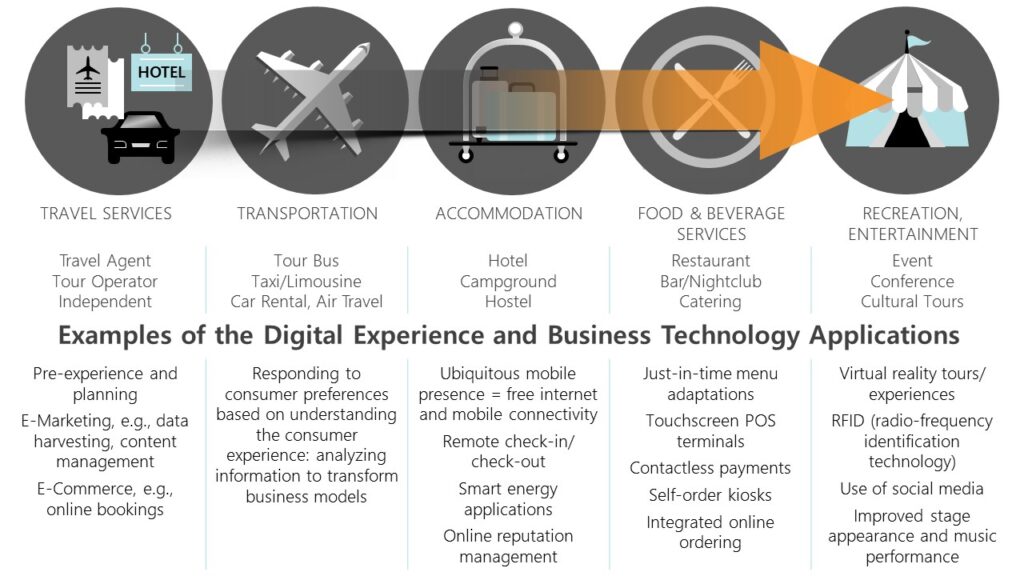The COVID pandemic has accelerated the impact of digitalization on tourism, and significant changes to business models and operational needs have triggered major workforce shifts.
COVID has demonstrated the need for digitalization to help businesses be more resilient and able to respond to disruptive events such as catastrophic weather (e.g., hurricanes, blizzards, tornadoes), bear markets, or pandemics.
The entire tourism experience has had to transform. Fundamental changes to how we interact and heightened requirements for safety and health measures mean that nearly every tourism product or service that involves human interaction has had to change. Since tourism is a high-contact industry, the nature of work and workplaces is undergoing rapid transformation. This impacts the types of skills or workers needed and involves increased application of technology to facilitate new protocols. And so, the big question is: what is the impact on jobs?
Early Adopter
The use of the technology is not new to the sector. The industry was an early adopter of technology to augment, automate, and improve services. Increased digitalization helps tourism businesses transform business models, scale services, and enter new markets. Investments in technology have resulted in increased market share, reduced costs, improved efficiencies, and reduced waste. Technology is used to facilitate improved and alternate means for customer engagement, such as the use of e-marketing or automated and touchless services. Businesses rely on technology to analyze ever-complex market data to identify new and emerging visitor markets. Increasingly, tourism businesses recognize that investing in the use of the technology is a necessity and will enable them to be more responsive to market fluctuations, consumer demands, changes in regulations, and business disruptions—ultimately: to be more resilient.
Historically, tourism’s adoption of technology was a response to digital travel trends and changing consumer demands. This chart provides a glimpse at the tourism experience—a basic illustration of the visitor journey along the value chain—and the types of digital interactions that guide the journey and help define the experience.
Today, the adoption of technology and increased move to digitalization is out of necessity. Tourism businesses require investments in technology to deliver on visitor experiences, and these investments are tied to their workers. COVID-19 is one example that has accelerated labour market transitions, where automation and many other factors have caused significant workforce changes and disrupted business practices.
Job Polarization
Adapting to a post-COVID business environment will require significant investments in the workforce. There are concerns about jobs at risk of automation; these often involve lower-educated workers performing tasks that require minimal skills. At the same time, the acceleration of digitalization is creating new opportunities and demands for workers with new or different skills.
The automation and digitalization of work and business practices will eliminate some jobs while creating others. This ‘job polarization’ is directly linked to business transformations intended to help make them more resilient to shocks or disruptions.
Identifying New Skills
Digitalization is a direct response to social, political, economic, and natural factors. COVID amplified and accelerated the labour market transformations that were already underway, due to factors such as globalization, increased focus on ecological practices, changing demographics, urbanization, and migration. The structural changes to business models are necessary to help businesses survive and cope with the changes. Skills demands are shifting because of these changes.
To illustrate the impact on jobs and skills, let’s look at some of the prevailing/new skills identified by Tourism HR Canada as being part of COVID recovery and improved structural changes to business models that will enable them to be more resilient and globally competitive. Each of these is dependent on investments in technology or the digitalization of functions.
Business innovation, e.g., workers with skills to:
- Develop and manage virtual services and virtual reality experiences (e.g., conferences, guided tours, hotel bookings)
- Innovate and implement product distribution to mitigate risks (e.g., food services, sales of craftworks)
Management of new business technology functions, with skilled staff to:
- Develop and conduct digital marketing strategies, including analytics
- Produce marketing content and respond to ongoing digital presence
- Manage digital products
Increased complexity and scope of financial management skills, for functions such as:
- Managing cashflow
- Seeking new revenue streams
- Procurement and supplier management (e.g., management of inventory systems, improving purchasing systems)
Community engagement and visitor-relations activities, such as skills and capacity to:
- Lead or contribute to community-led labour market action plans
- Improve on stakeholder/consumer engagement strategies
Business resilience, including workers with skills to:
- Research and develop new and ever-changing markets
- Crisis management and PR activities
Transforming human capital management practices will involve new models that include mixed workforces (permanent/anchor teams + casual/freelancers + shared workers). Skills are needed to:
- Transform HR practices and protocols and to respond and adapt to rapid changing regulations and labour law
- Work with ‘people analytics’
- Develop engagement strategies, measures, and supports
- Work with increasingly diverse populations
- Facilitate needs around mental health and other personal interests
Environmental and sustainable practices require workers with abilities to:
- Analyze business practices and identify ways in which the business is able to reduce reliance on ‘the grid’ or improve on its ecological footprint
- Analyze new regulations and translate the practices into operational compliance/business practices
- Conduct consumer research and define products or services that respond to consumer demands
- Tap into government incentivized programs/funding
Redefining the Tourism Workplace
So, what does all this mean in terms of jobs? Some workers will be more affected than others. Jobs will be redefined by the skills required, and by new ways of working (e.g., teleworking, use of digital tools). Shifts in consumer preferences will drive business decisions and require reskilling and upskilling, with a focus on workers that are able to work in a range of contexts (i.e., transferable skills).
The shrinking labour force will cause employers to work differently and with mixed workforces and to rely on more community-led models to facilitate this demand. Technology will help augment and enhance the skills needed while improving customer services and enabling businesses to expand or tap into new markets.
Research shows that the sum gain is more jobs are created, and with this a very different makeup of the workforce.
For more on this topic, watch The Impact of Digitalization on the Tourism Workforce.


